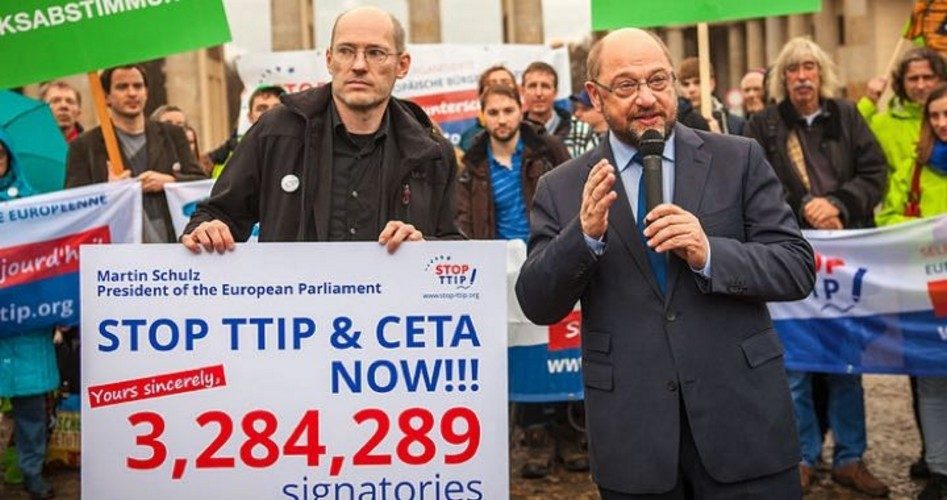
With much of the trade deal news focused on a possible new agreement between the United States and its two NAFTA partners, Canada and Mexico, U.S. Trade Representative Robert Lighthizer’s trip on Monday to Brussels to meet with European Union trade leader Cecilia Malmstrom should alert Americans of the dangers posed to American national sovereignty from the East.
While this trip was short, the two are planning on meeting again near the end of the month.
After President Donald Trump had threatened the EU with tariffs on automobiles entering the U.S. market from Europe, he backed off in July. Instead, Trump agreed with European Commission President Jean-Claude Juncker to suspend any such trade taxes for the time being, while other trade-related issues could be sorted out. At the time, Trump and Juncker agreed to eliminate technical barriers and establish “a close dialogue” on standards. Some changes might require changes in U.S. law, and would require action by Congress.
Malmstrom appeared pleased with the discussion, while admitting there were still “profound disagreements” between the EU and the United States over trade policy. “We discussed how to move forward and identify priorities on both sides and how to achieve concrete results in the short to medium term,” Malmstrom said. “Lots of work remains this autumn, our services will be in close contact in the coming weeks.”
Trump drew attention to trade with Europe when he condemned the 10-percent tariff the EU places on American automobiles. While he has temporarily suspended his previously announced intention to slap a 2.5 percent tariff on European cars, he has also insisted that he will do so even if Europe drops its own tariffs on American vehicles.
Another sticking point in any trade deal is agriculture. While the United States has expressed its desire that agriculture be included in any potential trade agreement between the United States and the EU, the Europeans are firmly against its inclusion, according to Malmstrom. France is particularly opposed to including agriculture in a trade deal (France has a larger farming economy than most European nations).
During the latter part of the Obama administration, it appeared that a comprehensive trade deal between the United States and the EU was imminent. Known as the Transatlantic Trade and Investment Partnership (TTIP), the deal was expected to create “deep and comprehensive” integration of the U.S. and European economies. For example, during the negotiations for the TTIP, the two sides even discussed regimented standards for such minutia as car blinkers and cosmetics. In 2014, polls indicated that the deal was supported by more than half of the American public and more than half of the German public. But by 2016, support had dropped to only 17 percent of Germans and 15 percent of Americans.
No doubt part of the reason for the decline in popular support were the same issues that caused the United Kingdom to withdraw from the EU in the “Brexit” referendum vote. The British public had become increasingly disenchanted with their membership in the EU due to its increasingly authoritarian character. Most decisions were being made by an unelected bureaucratic elite in Brussels, and these decisions were increasingly unpopular with the British public.
While out-of-control immigration, which is disrupting the social fabric across Europe, makes the most news, the growth of the welfare state and increasingly high tax rates, stagnant economies, and rules imposed upon almost every aspect of daily life, even including the size and shapes of fruits that are allowed to be sold, led many in the U.K. to say enough is enough. These rumblings in discontent are rising across the rest of Europe, as well.
When British Prime Minister Margaret Thatcher rejected the idea of a European super-state, which she clearly knew would curtail the national sovereignty of Great Britain, she was ousted from power by her own Conservative Party. In 1988, she said, “We have not successfully rolled back the frontiers of the state in Britain, only to see them re-imposed at a European level, with a European super-state exercising a new dominance from Brussels.” She compared such a super-state with the top-down model found in the Soviet Union.
Despite the truth of Thatcher’s remarks, globalists in America want to see this authoritarian super-state expanded to include the United States and, if the United States reenacts NAFTA, Mexico and Canada. And this economic integration will not stop there. One reason that the EU is so insistent that any agreement with the United States include automobiles is that will be necessary to make it compatible with the World Trade Organization (WTO), which is a global governing structure in trade.
As the average European has now discovered, and as Americans will, should they be so foolish to be pulled into any such “trade” deals, economic integration means government regulation of almost every aspect of human activity. For example, President Emmanuel Macron of France has publicly opposed any trans-Atlantic deal with the United States until the Trump administration capitulates to the Paris Climate Agreement. And, of course, the Paris “Climate” Agreement is yet another example of government control over all sorts of economic activity, infringing upon the liberty and the property rights of citizens of all the countries who have bought into the theory of anthropogenic global climate change. Regardless of the merits of that theory, it is quite clear that globalists, such as Macron, see it as a way toward increased government control over the personal lives of the average man and woman, and increased global governance.
While some Americans have bought the lie that these trade deals, dubbed “free trade” have something to do with “free enterprise,” they need to realize — quickly — that they have more to do with creating a global governing structure.
Photo: Jakob Huber via Wikimedia




